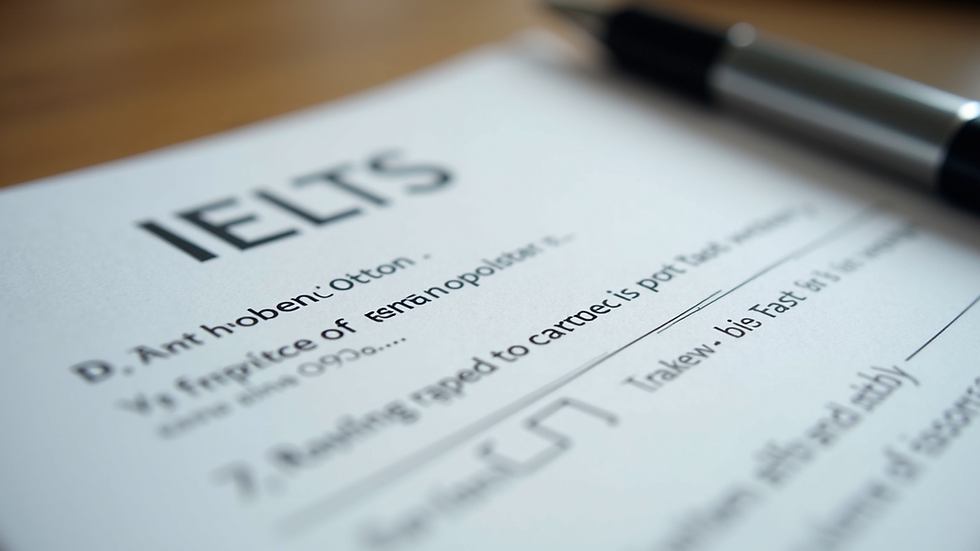Strategies to Excel in IELTS Writing
- Izzy
- Aug 1, 2025
- 4 min read
Updated: Aug 8, 2025
Preparing for the IELTS writing section can be challenging, but with the right strategies, you can excel and achieve a high band score. This post will guide you through practical tips and techniques to improve your writing skills specifically for the IELTS exam. Whether you are aiming for academic or general training, these strategies will help you write clearly, coherently, and confidently.
Essential IELTS Writing Strategies for Success
To perform well in the IELTS writing section, it is crucial to understand the exam format and what examiners expect. Here are some key strategies to keep in mind:
Understand the task requirements: Each writing task has specific instructions. Make sure you address all parts of the question.
Plan before you write: Spend 5-10 minutes planning your ideas and structure. This saves time and improves coherence.
Use a clear structure: Organise your essay or report into paragraphs with a clear introduction, body, and conclusion.
Vary your vocabulary and sentence structures: Avoid repetition by using synonyms and different sentence types.
Check your work: Reserve a few minutes at the end to proofread and correct grammar, spelling, and punctuation errors.
By applying these strategies, you can write more effectively and increase your chances of scoring well.

What is IELTS writing task 1 and 2?
The IELTS writing section consists of two tasks, each with different requirements:
Task 1: In the Academic module, you are asked to describe, summarise, or explain information presented in a graph, table, chart, or diagram. In the General Training module, you write a letter based on a given situation.
Task 2: This task requires you to write an essay in response to a point of view, argument, or problem. It tests your ability to present and support ideas clearly.
Understanding the differences between these tasks is essential for effective preparation. Task 1 focuses on factual description and summarisation, while Task 2 demands critical thinking and argument development.

How to Approach IELTS Writing Tasks Efficiently
Managing your time and approach during the exam is vital. Here are some actionable recommendations:
Allocate time wisely: Spend about 20 minutes on Task 1 and 40 minutes on Task 2, as Task 2 carries more weight.
Analyse the question carefully: Identify keywords and the type of response required.
Brainstorm ideas quickly: Jot down relevant points and examples before writing.
Write clear topic sentences: Each paragraph should start with a sentence that summarises its main idea.
Support your points with examples: Use specific examples to strengthen your arguments.
Use linking words: Connect ideas smoothly with words like "however," "moreover," and "in contrast."
By following these steps, you can write more organised and persuasive responses.
Improving Grammar and Vocabulary for IELTS Writing
Grammar and vocabulary are critical components of your writing score. Here are some tips to enhance these areas:
Practice complex sentence structures: Use a mix of simple, compound, and complex sentences to show grammatical range.
Learn common IELTS vocabulary: Focus on words related to common IELTS topics such as education, environment, technology, and health.
Avoid informal language: Use formal and academic language appropriate for the exam.
Use collocations and phrases: Phrases like "play a significant role" or "pose a challenge" make your writing more natural.
Review common grammar mistakes: Pay attention to subject-verb agreement, verb tenses, articles, and prepositions.
Regular practice and feedback can help you identify and correct errors, improving your overall writing quality.

Practice Makes Perfect: Using Sample Questions and Feedback
Consistent practice is the key to mastering IELTS writing. Here’s how to make the most of your practice sessions:
Use official sample questions: Practise with real IELTS writing prompts to get familiar with the format.
Time yourself: Simulate exam conditions to improve your speed and efficiency.
Seek feedback: Have teachers, tutors, or peers review your writing and provide constructive criticism.
Rewrite and improve: Use feedback to revise your essays and learn from mistakes.
Read high-scoring sample answers: Analyse what makes them effective and try to incorporate similar techniques.
For more detailed practice and tips, explore ielts writing tasks resources online.
Final Tips to Maximise Your IELTS Writing Performance
To finish strong on exam day, keep these final tips in mind:
Stay calm and focused: Anxiety can affect your writing quality, so practice relaxation techniques.
Follow word count guidelines: Write at least 150 words for Task 1 and 250 words for Task 2.
Use paragraphs effectively: Don’t write one long block of text; break your writing into clear paragraphs.
Avoid memorised answers: Examiners can spot memorised content, which may lower your score.
Keep practising regularly: Consistency is key to improvement.
By integrating these strategies into your preparation, you will be well-equipped to excel in the IELTS writing section and achieve your desired band score.



Comments